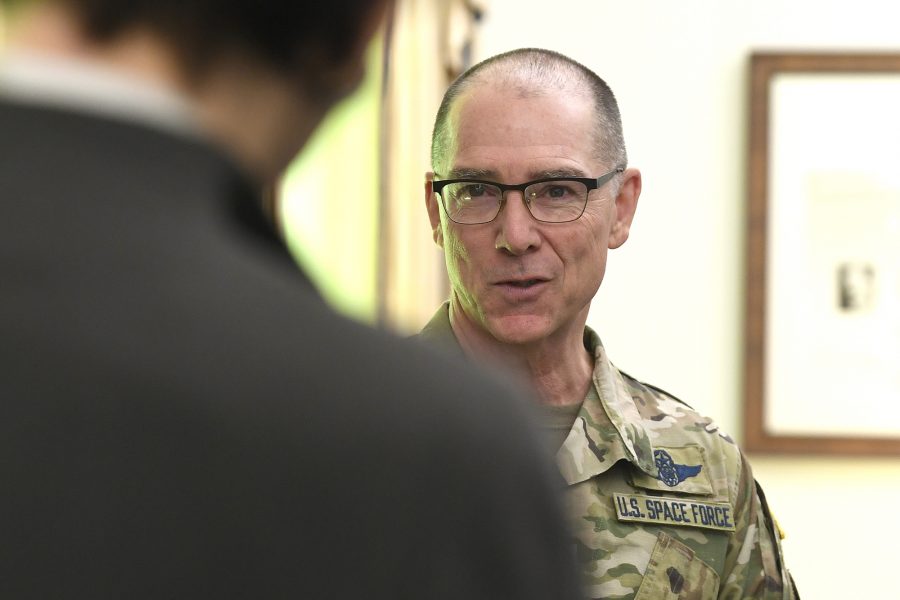Enlisted Airmen who sign up for the Space Force can expect to see a broader range of career opportunities than they had during their time in the Air Force, the service’s senior enlisted adviser told Air Force Magazine in an exclusive interview.
Chief Master Sgt. Roger Towberman, who formally joined the Space Force April 3 to help chart the fledgling service’s direction, said enlisted personnel could take on multiple specialties over the course of their career, making on-the-job training even more important.
“I don’t believe that we’ll be able to bin and specialize like they do in the Air Force, so that means their jobs will be different,” Towberman said April 30. “From assignment to assignment, or base to base, what you’re being asked to do may change more than it does in the Air Force just because our small numbers will require that.”
About 6,000 enlisted space professionals are assigned to the Space Force, according to a service spokesman. Intel and cyber personnel may get more unique career paths than enlisted space operators, for whom Towberman doesn’t foresee any immediate changes.
“That’s exciting to me, on the intel and cyber side, to think that maybe there’s options that they wouldn’t have in the Air Force,” he said. “If I come in as a signals analyst in the Air Force, I’m going to, for the most part, stay a signals analyst. But maybe in the Space Force, I might be a signals analyst to start, and I may end up being a targeteer one day in my career field just through the natural development paths that we come up with.”
He noted that new avenues were opening up for enlisted space employees, even before the Space Force was created in December, like an Air Force Weapons School course that began in July 2019 and is preparing to graduate its second class.
That program trains enlisted instructors to be unit-level leaders and subject matter experts at the squadron level who improve weapons and tactics training. Graduates advise unit commanders on tactics and space crew operations, develop training exercises, and run mission-planning cells that find courses of action a unit can take to deal with emerging threats.
“With that kind of, I’ll call it branded expertise, once you’ve been through an official school and we can put a patch on your shoulder, it changes your maneuver space as a warfighter,” Towberman said. “It improves your capability, but it also really improves your credibility at first glance. I think that will give us options to use [non-commissioned officers] and senior NCOs, in particular in the Joint Force, in different ways that we’ve used them in the past.”
A new legislative affairs program will bring enlisted space operators to Capitol Hill next year, Towberman added during an April 16 virtual town hall.
The Space Force needs to decide how to ensure the enlisted personnel who come in can handle an assortment of skills rather than specialize in one area. That’s one piece of a broader look at recruitment as the Space Force aims to be choosier about new hires, offer more fluid movement between the service and industry, and speed up the current process.
Officials haven’t dug into what new specialty codes might be created for enlisted personnel, though Towberman said there will have to be new nomenclature as the service and space domain evolve. One hurdle to rolling out new career fields is ensuring that personnel and pay systems adjust to the changes.
“What a mistake it would be to change someone’s [Air Force Specialty Code] and have it all of a sudden cancel their reenlistment bonus because of some system that was connected to a code,” Towberman said. “We’re trying to make sure that we’re careful on all that, but I suspect we will become individualized over time.”
Enlisted Airmen who work in space systems operations, operations intelligence, geospatial intelligence, signals intelligence, fusion analysis, targeting analysis, cyberspace support, and client systems are allowed to volunteer for the Space Force through May 31. Those initial volunteers will be able to re-enlist in the new service starting this fall, as officials try to smooth the transfer process.
Most people shouldn’t notice much change in their service, Towberman said.
“If you’ve got a promotion line number, we’re going to delay the start of your transfer until that takes effect, for instance, to keep those lines clean,” he said. “If you have three years or four years left to serve on your current contract, then you will continue to serve that and we’ll transfer you over and that time will come with you. If you’re less than two years, then we will ask you to take on that two-year Active-duty service commitment.”

